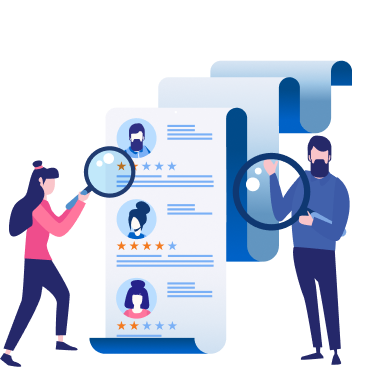- 34279, Duffy Terrace, Fremont California 94555
Frequently Asked Questions
GENERAL QUESTIONS Web App Development
Mobile App Development
Web App Development
Numerous web apps are constantly being introduced to the market, providing you with a multitude of choices for selecting a web app development platform.
- Angular JS developed by Misko Hevery at Google; Popular brands built – Netflix, Amazon, PayPal, etc.
- ASP.NET developed by Microsoft; Popular brands built – Slack, Alibaba, MasterCard, etc.
- Ruby on Rails developed by David Heinemeier Hansson; Popular brands built – Airbnb, Shopify, Zendesk, etc.
- React was built by Jordan Walke, at Meta; Popular brands built – Facebook Ads, Instagram, etc.
The timeframe for each web app development project will vary based on factors like requirements, complexity, available resources, and expertise, making it challenging to accurately predict a specific range.
REWRITE PARAGRAPH
The timeline for building a web app varies based on the project’s scope. On average, constructing a web app from the ground up typically requires 4-5 months. Alternatively, if all the modules for the web app are prepared in advance, the timeframe may be shortened to 3-4 months.
Precisely communicate your requirements to your web app development partners to potentially optimize the timeline.
Developing a comprehensive web application typically involves progressing through seven distinct stages. Below, we have outlined the workflow of web application development from the beginning.
- Stage 1: Gather your requirements
- Stage 2: Design the wireframe mockups
- Stage 3: Add interactive elements & functionalities
- Stage 4: Develop the front-end and back-end of the web app through coding
- Stage 5: Add content to all sections
- Stage 6: Web app testing and QA
- Stage 7: Post-launch maintenance of the web app
The total cost of developing a web app is determined by the project’s complexity and requirements. We can only provide estimates based on average price ranges. For a simple web app project, the cost typically falls between $15,000 and $50,000. However, for more complex projects, the cost may range from $50,000 to $150,000.
If you have specific needs and would like to inquire about a personalized price estimate, please click on this link.
There are various types of web applications, such as:
- Static web apps
- Dynamic web apps
- Single-page web apps
- Multiple page web apps
- Content management systems
- Portal web apps
- Progressive web apps
- E-commerce web apps
- Animated web apps
Collaborating with a web app development agency is beneficial when you lack the expertise or time to focus on development tasks. It’s essential to ensure that the agency you choose has specific experience in your industry.
ByteCipher has extensive experience and expertise in web app development. Additionally, our track record of working with diverse clients across various industries such as education, healthcare, travel, real estate, finance, e-commerce, and more positions us well to provide you with the optimal solution.
When partnering with a web app development agency, it is crucial to consider their experience in the field. Reviewing their portfolios, client interactions, customer feedback, and case studies is vital. Similarly, assessing the duration of their web app development service provision is significant.
ByteCipher has over 8 years of experience in the web app development industry. To see our achievements in web app development, feel free to browse through our portfolio. You can trust us for all your web app development requirements.
Web applications consist of client-side (front-end) and server-side (back-end) programming technologies. The technology and tools utilized are crucial in the development of web applications.
The features, design, user experience, and outcomes of your web app will depend entirely on the technology stack. Therefore, it is essential to have a foundational knowledge of the available tech stacks when choosing a web app for your business.
At ByteCipher, we utilize HTML and CSS for front-end development, and for back-end development, we employ Java, PHP, and JavaScript.
Just as you keep your new car or home in good condition, it is equally important to maintain your web application. Purchasing a new car or home is not the end; you must consistently clean, paint, and repair them.
A web application also needs regular maintenance. For your web application to run as smoothly as possible, you need upgrade the software, address issues, and do other things. Without a developer’s assistance, it is not feasible. It is therefore advisable that you find out from your agency whether or not they will handle the upkeep.
In addition to fixing bugs, we at ByteCipher also handle database management, speed optimization, software updates, and bug repairs for online applications.
It’s a wise decision for you to redesign your current web application. You can get numerous benefits from a flawless redesign, including increased traffic, increased SEO visibility, and assistance in keeping up with current trends.
Redesigning something successfully is the developer’s responsibility. A skilled web app development service provider can be identified by their actions. Expert developers will make backups, examine the current web application, monitor performance, and more prior to redesigning.
One such web app development company that takes accountability and offers your current web app a new style is ByteCipher.
People use a variety of devices and browsers to access and consume material from the internet these days. Therefore, it is imperative that your online application work with all browsers, screen sizes, and resolutions. User engagement and bounce rate will be the main problems if your web app is incompatible.
The experts will apply the appropriate coding to make your web application browser-screen pleasant. Because of the benefits of web app compatibility, we at ByteCipher create applications that work effectively on a variety of devices and browsers to meet your demands.
You will be required to provide personal information, such as your phone number, login credentials, end-client details, and so on, when you sign up with an agency for the development of your web application. The agency will sign an NDA with you as confirmation of data security.
When developing a web application, non-disclosure agreements (NDAs) are a delicate subject. This is an indication that you and the agency agree that your data is secure and not subject to fraud or theft.
We at ByteCipher, your dependable web app partners, are extremely concerned about the security and privacy of your data. You may be confident that your data is in safer hands because we properly sign NDAs with our clients and partners before we begin any operations.
Both traffic and engagement are necessary for a web application to be operational. If the traffic to your online application is substantial and the bounce rate is significant. Then, to keep your consumers interested, implement a variety of interactions.
How successfully you communicate and engage with users on the web app will determine how long you can keep them as users. Developers use a variety of techniques to do this, including movies, animations, live chat interactions, text readability improvement, and load speed optimization.
Every journey of great length begins with one step. You reaching out to us is that one step!
Our ByteCipher team can be contacted by phone, email, social media, or by submitting a form. Our sales representative will speak with you initially to learn about your expectations. Next, put you in contact with our web app development group. After the talk, our developers will spend a lot of time researching websites and coming up with ideas on how to move the project forward.
The lengthy trek starts there.
When you sign up for ByteCipher’s web app development services, we will assign a committed team to handle any project—new web app development or redesign. The group will consist of developers, a lead, and a project manager.
We will create a custom pricing plan that includes costs for time, materials, and resources based on your specifications. Other than that, we don’t charge you anything else unless and until we require something, like a plugin purchase or another requirement.
The secret to a successful web app development project is communication. A skilled web app development team will communicate with you in a highly cooperative manner. We at ByteCipher never carry out a basic task without first getting your permission.
We will divide up and establish both little and large milestones at the beginning of your project. We will notify you of the project’s status as soon as the designated milestone is reached. So, don’t worry—we won’t abandon you alone in a dark room. To keep you updated on background activities, our staff will schedule a call once every three days or twice a week.
Naturally, we do. We do not assume complete ownership of your project just because you have entrusted it to us. Every time we have a proposal, we make sure you are aware of it and why we are suggesting it. We will not move further until we have received your approval.
Without a doubt. Actually, we’re looking forward to it. We’ve had a great deal of clients come to us with the simple declaration, “We need a web app for our business.” We will explain the value of a web app to them and ask about their target market, business history, niche, and other pertinent business-related details in an understanding manner.
We will develop a unique solution while taking all of these into consideration. Therefore, don’t worry if you don’t have a clue; we’ll help you figure it out.
Of course. End-to-end digital solution provider ColorWhistle also provides white-label B2B assistance. We may offer us assistance with your digital marketing and internet promotion after your web app goes live.
We will make your presence known online via blogs, social media posts, SEO, and other digital marketing initiatives.
A web server, application server, and database are needed for a web application to function. The user will submit a request to a web server, which will then forward it to an application server for processing. The details will be kept in the database.
A web server typically costs between $70-$320 per month. Certain web servers also require annual subscriptions. Your selection of server may have an impact on the price.
Yes, without a doubt. To get started, simply send us a message or give us a call at +91 96993 56148. We’ll answer your questions!
- WordPress Development Faq
- FAQ Page Design Examples
- Faq On Website Development
- Faqs For All Services
- Faqs On Graphic Design
- Faqs On Website Redesign
- Faqs On White Label Outsourcing
- Faqs On Low Code Development
Other FAQ blogs gathered for further details
You can freely click on the other popular FAQ articles that best fit your needs!
Mobile App Development
We use cross-platform frameworks like React Native or Flutter along with native development languages like Swift or Kotlin to create mobile apps for both the iOS and Android operating systems.
Take into account elements such as time-to-market, performance, scalability, developer expertise, and project needs. Examine and try out various frameworks to see which one best suits your needs.
Ideation, planning, design, development, testing, deployment, and maintenance are usually included in the process. Stakeholder cooperation and meticulous attention to detail are necessary at each phase.
ByteCipher puts the user experience first, using wireframes and prototypes to show the functionality and flow of the program. Early feedback and improvement are possible through this iterative process before moving on with complete development.
The length of development depends on the platform, features, complexity, and team size. While more complicated apps could take a year or longer, simpler ones might only take a few months.
Several variables, including features, design intricacy, development duration, and developer hourly rates, influence costs. While more complex apps might cost hundreds of thousands or even millions of dollars, a basic app might only cost a few thousand dollars. That’s a $5,000 to over $500,000 difference!
Platform-specific languages, such as Swift for iOS or Java for Android, are used to create native apps, which offer better performance and access to native capabilities. Native apps are created especially for one platform. In contrast, hybrid applications employ web technologies (HTML, CSS, and JavaScript) enclosed in native containers, hence facilitating cross-platform interoperability at the possible expense of performance.
Indeed, ByteCipher provides cross-platform development options using frameworks such as Flutter and React Native. We can save time and resources by writing code only once and have it run on numerous platforms thanks to these frameworks.
To make sure that our mobile apps work well across a range of screen sizes and resolutions, ByteCipher uses responsive design techniques and rigorous testing on a variety of devices. This entails using responsive design concepts and doing testing on emulators and actual devices.
To guard against weaknesses and potential cyber threats, we deploy secure authentication procedures, encrypt important data transmissions, and update app security measures often. To find and fix any security vulnerabilities, we also carry out penetration tests and security audits.
We follow data protection laws like the CCPA and GDPR, putting privacy policies into place, getting user consent before collecting data, and, when needed, anonymizing or pseudonymizing user information. Additionally, we give top priority to secure storage procedures, data encryption, and limiting authorized personnel’s access to data.
A mobile app that is successful must have an easy-to-use interface, strong functionality, excellent performance, frequent updates, and attentive customer service. It should provide easy navigation, successfully meet a particular user demand, and include feedback loops for ongoing development. Strategies for marketing and promotion are also essential for attracting and keeping users.
Designing a mobile app interface with ease of use involves following best practices, which include putting an emphasis on accessibility for all users, clear visual hierarchy, simple navigation, and consistent design elements.
Developers can reduce the size of their apps, optimize multimedia and images, use caching techniques, minimize HTTP requests, use efficient coding techniques, test and profile their apps frequently, and look for bottlenecks in order to maximize mobile app performance.
Through push notifications, a mobile app allows for direct customer communication while providing real-time information and promotions. Real-time capabilities such as in-app messaging allow users to interact with your brand right away. Users can receive push notifications as straight alerts about fresh content or deals. Furthermore, features like feedback forms make communication easier and increase client satisfaction. All things considered, the app cultivates a lively and participatory interaction between your company and its clients.
It is possible to move current mobile apps to more recent platforms or technologies using techniques like rewriting code, utilizing cross-platform development frameworks, utilizing migration tools, and making sure the app complies with the new platform’s guidelines. This will enable improved functionality and performance.
The use of AI and machine learning for personalization and predictive analytics, the emergence of augmented reality (AR) and virtual reality (VR) applications, the spread of Internet of Things (IoT) integration, and the growing acceptance of progressive web apps (PWAs) for cross-platform compatibility and improved user experience are some of the most recent trends in mobile app development.
After distribution, the ByteCipher methodology for fixing problems or defects in mobile apps takes a methodical approach to guarantee prompt and efficient resolution. Here’s how we approach these problems:
- Issue Identification: Receive bug reports from users and conduct thorough testing to replicate.
- Prioritization: Prioritize bugs based on severity and impact on user experience.
- Resolution: Analyze root causes, implement fixes, and conduct testing.
- Testing: Verify fixes through comprehensive testing, including regression testing.
- Deployment: Deploy fixed versions to app stores or users through updates.
- Monitoring: Continuously monitor post-deployment to ensure effectiveness of fixes.
- Feedback: Gather user feedback to identify any remaining issues.
- Documentation: Maintain detailed documentation of resolved issues and lessons learned for future reference.
The primary distinctions between developing apps for iOS and Android are the programming languages (iOS: Swift or Objective-C, Android: Java or Kotlin), the development environment (iOS: Xcode, Android Studio), the design guidelines (iOS: Human Interface Guidelines, Android: Material Design), and the distribution channels (iOS: Apple App Store, Android Play Store).
How to upload a mobile application to the Apple App Store:
- Enroll in the Apple Developer Program, get your app ready for publication by following the App Store Review Guidelines, set up an App Store Connect account, upload your app’s assets and binary, complete the app’s metadata, submit it for review, and then release it to the App Store after it has been approved.
To submit your app to the Google Play Store for mobile devices:
- In order to publish your app, you must first create a Google Play Developer account, prepare it in accordance with Google’s guidelines, upload the APK file, add metadata and app details, configure pricing and distribution, and publish it.
Legal factors to take into account when developing mobile apps include
- Copyright defense for text, images, and code.
- Protection of app names and logos through trademarks.
- Licensing contracts for libraries and APIs from third parties.
- policies for privacy that adhere to data protection standards like the CCPA and GDPR.
- Terms of service detailing the obligations and rights of the user.
- Intellectual property rights and patent considerations for special app features and technologies.

























